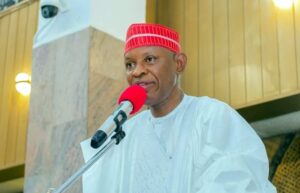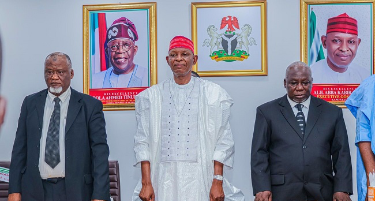Governor Abba Yusuf of Kano State has taken a firm stance in the wake of the violence and destruction that disrupted the #EndBadGovernance protest, launching a significant initiative to address the chaos that ensued. On Monday, the governor took a pivotal step by inaugurating a 14-member Judicial Commission of Inquiry (JCI) tasked with delving deep into the causes and aftermath of the unrest, identifying those responsible, and ensuring justice is served.
This commission, which is being chaired by retired Justice Lawan Wada Mahmoud, has been given a comprehensive mandate. It is set to investigate the tragic killings, widespread looting, and extensive damage to both public and private properties that occurred during the protests. The protests, which initially started as a peaceful demonstration, were soon hijacked by elements that Governor Yusuf referred to as “economic saboteurs,” who used the protest as a cover to wreak havoc.
 Speaking at the inauguration ceremony held at the Government House, Governor Yusuf expressed his profound concern over the violence that marred what was supposed to be a peaceful protest for better governance. He underscored the economic impact of the destruction, which has affected not only government infrastructure but also the livelihoods of ordinary citizens. In his remarks, he emphasized that those responsible for orchestrating and carrying out these violent acts must be brought to justice to restore peace and order in the state.
Speaking at the inauguration ceremony held at the Government House, Governor Yusuf expressed his profound concern over the violence that marred what was supposed to be a peaceful protest for better governance. He underscored the economic impact of the destruction, which has affected not only government infrastructure but also the livelihoods of ordinary citizens. In his remarks, he emphasized that those responsible for orchestrating and carrying out these violent acts must be brought to justice to restore peace and order in the state.
A statement released by the Governor’s spokesperson, Sanusi Bature Dawakin Tofa, further highlighted the gravity with which the state government views this inquiry. Governor Yusuf, in the statement, called on the commission members to carry out their responsibilities “without fear or favor,” ensuring that all findings are objective and thorough. He stressed the need for accountability, noting that the establishment of the Judicial Commission of Inquiry is a fulfillment of the promise he made during his visit to inspect the damage caused by the riots.
“The setting up of the Judicial Commission of Inquiry is in fulfillment of the pledge made during the inspection of the destroyed facilities,” the governor stated. “We want the panel to dig deeper into the remote and immediate causes of the senseless destruction, as well as identify the masterminds so that the law of the land can take its full course.” This commitment underscores the government’s intention to not only find those directly involved but also to understand the broader circumstances and influences that led to the escalation of violence.
Additionally, Governor Yusuf directed the commission to investigate the reported theft of critical documents from the high court complex, including sensitive criminal files and important exhibits. He made it clear that no one, regardless of their societal status or political position, would be above the law. “Invite anyone found wanting to answer questions, whether in Kano or anywhere in the country, regardless of status or position in Nigeria,” he instructed the commission. This directive indicates a no-nonsense approach to the investigation, reinforcing the governor’s commitment to transparency and accountability.
The commission’s terms of reference are broad and detailed. They include uncovering the root causes of the unrest that erupted in early August 2024, identifying those individuals or groups responsible for inciting and perpetuating the violence, and providing actionable recommendations to prevent such incidents in the future. The commission is also tasked with assessing the full extent of the damage to properties, the loss of lives, and the financial value of items that were looted during the unrest.
Governor Yusuf expressed confidence in the commission’s ability to carry out its work diligently, referencing the Kano State Commission of Inquiry Law, Cap 36, Laws of Kano State of Nigeria, 2018, which provides the legal framework for the inquiry. “It is gratifying to know that in carrying out its functions, the commission is to be guided by the provisions of section 8 of the Kano State Commission of Inquiry Law,” he said, underlining the legal and procedural rigor expected of the inquiry.
Retired Justice Lawan Wada Mahmoud, speaking on behalf of the commission members, expressed gratitude for the trust placed in them by the Kano State government. He assured that the commission would undertake its duties with utmost diligence and impartiality, upholding the principles of justice. “We promise to do this assignment to the best of our ability without fear or favor and will justify the confidence reposed in us by the state government,” Justice Mahmoud declared, signaling the commission’s readiness to tackle the daunting task ahead.
The composition of the commission includes a diverse group of individuals, each bringing valuable expertise and perspectives to the table. Among the members are legal experts like Barrister Tajuddeen Funsho and Barrister Sagir Suleiman Gezawa, security officials such as ACP Munir Madugu, and representatives from various sectors including academia, represented by Prof. Musa Muhammad Borodo, and civil society, represented by Ambassador Ibrahim Waiya. The commission also includes members from religious and community backgrounds, like Rev. Murtala Mati Dangora, ensuring a comprehensive approach to the investigation. Barrister Salisu Marmara has been appointed as the Secretary of the Commission, ensuring that administrative and logistical aspects are well managed.
The inauguration ceremony concluded with a strong reaffirmation of the government’s dedication to upholding justice and ensuring the safety and security of all Kano State residents. Governor Yusuf’s actions and the establishment of the Judicial Commission of Inquiry reflect a broader commitment to addressing not just the symptoms but the root causes of unrest and discontent, aiming to prevent future occurrences and foster a more stable and peaceful society. As the commission begins its work, the people of Kano State and Nigeria at large will be watching closely, hopeful for a thorough investigation that will lead to meaningful outcomes and lasting peace.




